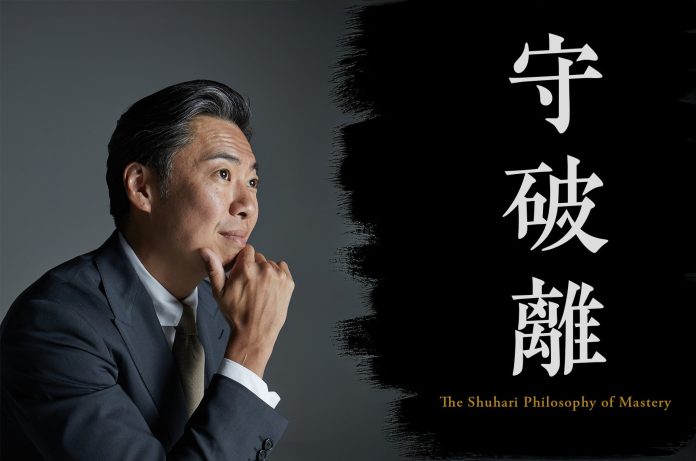In a world defined by rapid change, businesses and individuals alike face a critical challenge: How can we honor core values while navigating relentless innovation?
Shuhari—an ancient Japanese concept rooted in tea ceremonies and martial arts—offers a guiding framework that reconciles timeless wisdom with transformative progress. Originally associated with mastering a craft, Shuhari has evolved to become a powerful idea relevant to modern leadership, business strategy, and personal growth.
DK Sugiyama: A Modern Advocate of Shuhari
A leading champion of Shuhari is DK Sugiyama, the visionary CEO of ILI.inc. Over the years, Sugiyama has consistently applied its principles to excel in cross-border business assistance, media strategy, branding, and global innovation. Reflecting his unwavering belief in Shuhari’s potential, Sugiyama will release his 5th book on Shuhari in 2025, offering deeper insight into how these timeless principles can drive sustainable success in an ever-changing marketplace.
Sugiyama’s career itself reflects the Shuhari journey. He launched his first company at just 19, laying a Shu (守) foundation by mastering fundamental business principles early on. In his thirties—a Ha (破) phase—he refined and reimagined these principles, building a vast network across borders and experimenting with new strategies. Now in his forties, he enters a Ri (離) stage, transcending traditional boundaries to pioneer cutting-edge initiatives at a global scale.
Understanding Shuhari: The Philosophy of Mastery
At its core, Shuhari is a three-stage framework for learning, adaptation, and innovation:
1. Shu (守 – Obey or Protect)
In this foundational stage, one focuses on absorbing established rules, traditions, and best practices. Discipline, humility, and respect for longstanding wisdom are paramount.
2. Ha (破 – Break or Detach)
Having internalized core principles, learners begin to question and refine them. This phase involves proactive experimentation and innovation, evolving the original wisdom to address contemporary challenges.
3. Ri (離 – Transcend or Leave)
In the final stage, mastery transforms into creativity and free-form innovation. Individuals and organizations transcend old frameworks, driving new possibilities while remaining aligned with the spirit of the craft.
These stages underscore a lifelong process of learning, transformation, and contribution—making Shuhari especially relevant in today’s fast-paced world.
A Roadmap for Sustainable Growth
Shuhari naturally aligns with modern business challenges, offering a structured yet flexible path to resilience and success.
1. Shu: Laying the Foundation
During Shu, organizations concentrate on established techniques and proven market insights. ILI.inc, under DK Sugiyama’s leadership, exemplifies this principle by mastering cross-border business assistance, media strategy, and branding. Their disciplined approach ensures a stable base on which to build.
In this stage, companies also refine internal processes, study competitors, and reinforce cultural understanding—setting the groundwork for more complex future endeavors.
2. Ha: Accepting Change and Innovation
Once a solid foundation is in place, the Ha stage invites questioning of established norms and active pursuit of innovation. ILI.inc demonstrates this by integrating AI, predictive modeling, and data analytics into their services. Projects like AI-powered tools for the visually impaired go beyond mere technology adoption; they reflect a commitment to societal impact alongside commercial success.
This phase embodies the essence of progress: push boundaries, adapt to new contexts, and remain grounded in fundamental values.
3. Ri: Achieving Mastery and Transcendence
At the Ri stage, businesses transcend traditional limits and lead the way for entire industries. Creativity and intuition replace rigid conformity, allowing organizations to inspire others and set new standards. ILI.inc, for example, collaborates with major global players such as Apple and Microsoft—an indicator of true mastery, combining cultural awareness, innovative strategy, and deep client understanding.
Core Fundamentals of Shuhari for Business
1. Continuous Learning and Adaptation
Shuhari treats growth as a never-ending journey. Companies must stay curious, learn from their experiences, and pivot as challenges arise.
2. Respect for Tradition and Innovation
By acknowledging time-tested insights while exploring emerging possibilities, organizations remain both stable and forward-thinking.
3. Pursuit of Mastery
At every level, Shuhari emphasizes the drive to excel in one’s core capabilities while also pushing boundaries and breaking new ground.
4. Cultural and Contextual Awareness
Shuhari encourages empathy and understanding across diverse markets—a vital component of effective cross-border communication and collaboration.
The Influence of Shuhari on Modern Organizations
Shuhari’s principles foster a culture of continuous improvement, enabling businesses to address uncertainty with agility and confidence. From strategic planning to product innovation, these ideals encourage sustainable growth and broader societal impact. ILI.inc showcases this transformation, assisting global firms in cross-cultural engagement, technological adaptation, and bold market expansion. By turning obstacles into opportunities, they exemplify how Shuhari-inspired thinking leads to tangible business advantages.
Shuhari as the Bridge from Tradition to Innovation

Ultimately, Shuhari offers a balanced path that unites the wisdom of the past with the demands of the present and the future. As DK Sugiyama and ILI.inc demonstrate, it’s far more than a theoretical concept—it’s a powerful tool for guiding companies toward mastery, relevance, and positive impact. With Sugiyama’s 5th book on Shuhari set for publication in 2025, leaders worldwide can learn how to integrate these ancient principles into cutting-edge business practices.
By embracing the Shuhari philosophy at each stage—learning diligently (Shu), innovating responsibly (Ha), and ultimately shaping new frontiers (Ri)—organizations can evolve with purpose. This journey from tradition to innovation isn’t merely possible; it’s a fulfilling and necessary path toward sustainable progress for both businesses and society at large.
Explore More
- DK Sugiyama’s Website: https://dksugiyama.global/
LinkedIn Profile: https://www.linkedin.com/in/dk-sugiyama



 Bitcoin
Bitcoin  Ethereum
Ethereum  Tether
Tether  XRP
XRP  Solana
Solana  USDC
USDC  Cardano
Cardano  TRON
TRON  Lido Staked Ether
Lido Staked Ether  Avalanche
Avalanche  Toncoin
Toncoin